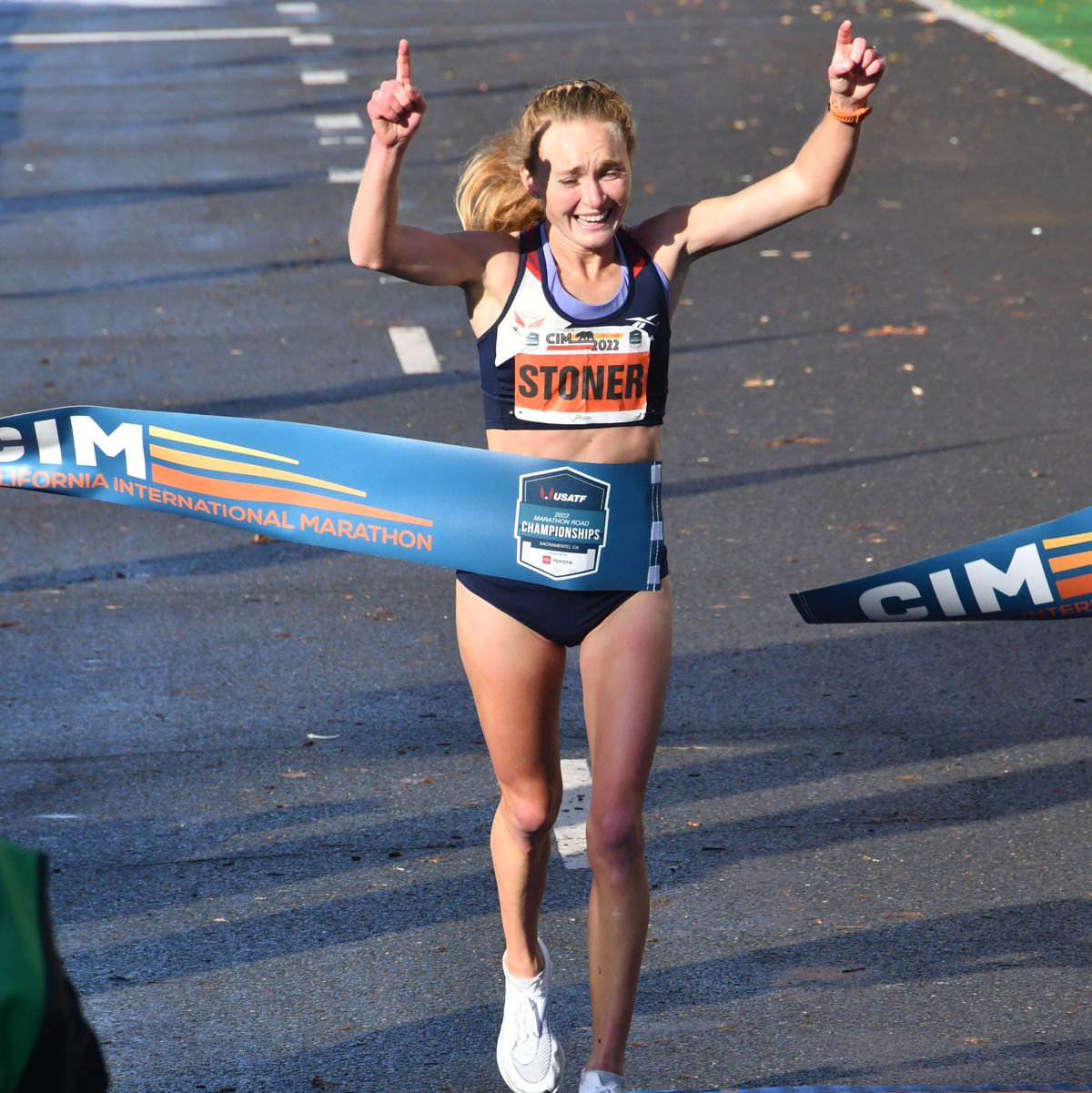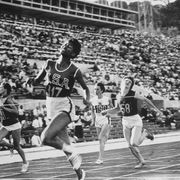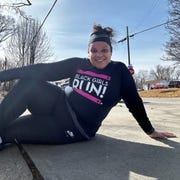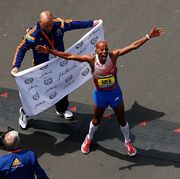A year ago, Paige Stoner questioned whether the marathon was the right distance for her racing career. Coming off her second 26.2—a tough 2021 Boston Marathon in which the downhills took a heavy toll on her legs—the 26-year-old pro wondered if her promising 2:28 debut was a fluke. On Sunday, December 4, Stoner demolished those doubts when she became the U.S. champion at the California International Marathon (CIM) in Sacramento.
In her third marathon, Stoner raced beyond her years to claim her first national title. For most of the distance, she competed with former triathlete Lauren Goss. The Syracuse alum widened the gap in the final miles, ultimately breaking the previous course record by 51 seconds and clocking a new personal best in 2:26:02.
“The goal coming in was definitely to get the win, and then if a fast time came with it, that would be a bonus,” Stoner told Runner’s World on a call after arriving home in Flagstaff, Arizona. “I don’t think there could’ve been a much better outcome.”
More From Runner's World

The performance is especially impressive given Stoner’s buildup, which included moving across the country and coaching herself through the training cycle, for a race that ultimately proved she’s right where she needs to be.
Embracing the rigors of high altitude
At the end of July, Stoner moved from Charlottesville, Virginia, where her training group, the Reebok Boston Track Club is based, to Flagstaff to kick off the marathon training cycle. Her training partner, Josette Norris, was still focused on the track and Stoner wanted more women to train with on the roads, she said.
In the planning process, her agent, Josh Cox, also encouraged her to utilize marathon training partners to help prepare for such a time intensive event. “Doing a marathon build solo is possible, but it’s not easy and I didn’t want to put that on her. I did it prior to the 2004 (Olympic Marathon) Trials, and on workout days, it was truly a you versus you dynamic,” Cox told Runner’s World. “Makes it tough on those longer workout days and can wear on you mentally.”
In Flagstaff, Stoner connected with fellow marathoners Sarah Pagano and Emily Durgin, who focused on preparing for the New York City Marathon. It took Stoner about eight weeks to adjust to the high altitude setting, which gave her plenty of time to dig into the heart of the training cycle. Once Durgin and Pagano entered their recovery phase following their race in early November, Stoner was on her own for CIM but found plenty of training partners in the running hub.
Coaching herself
For this marathon build, Stoner wrote her own training while consulting with a few of coaches along the way. When she moved to Flagstaff, she wanted to have the flexibility to hop in workouts with other runners, and she didn’t want Chris Fox (head coach of the Reebok group) to take the time to write a full training plan, she said. If she had specific questions about workouts, Fox provided guidance from afar in Charlottesville.
When coming up with her own training plan, Stoner drew from past and present coaching influences, including Fox, Brien Bell (her college coach), and Terrence Mahon, who coaches Pagano and Durgin. “Paige is willing to do whatever training is necessary. She more than knows what works for her,” Fox told Runner’s World.
In the last few months, Stoner logged her highest mileage ever with two 115-mile weeks, up from 110 ahead of the 2021 Boston Marathon and 105 before the 2020 Marathon Project.
This year, she also changed her taper schedule, which proved to be a game changer in races. After putting together months of high mileage, Stoner used to take three days to taper before a race. Now she begins her taper by cutting down long runs and workouts two weeks before a competition.
Checking in
The shift from living at sea level to high altitude (Flagstaff sits at nearly 7,000 feet of elevation) put more stress on Stoner’s body while training, but she managed to find a balance between challenging herself and staying healthy. She increased her mileage but adjusted her paces and focused on nailing the right effort for each workout. “It’s really important to learn how to be in tune with your body and learn how to manage energy expenditure over the course of a long run or a workout up here,” Stoner said. “And I think that helped a lot come race day.”
In Sacramento, Stoner had a range of paces she was shooting for, but several miles into the race, she decided to change her plans. “I ended up running a bit faster than [the paces] from the start, and I was telling myself not to panic because I was feeling really good, and I had all that practice from gauging my effort,” she said, explaining that instead of checking her splits on the watch, she checked in with how she was feeling by paying attention to her breathing patterns.
The pandemic moved up her marathon plans
Stoner grew up as a competitive gymnast in Pottsville, Pennsylvania, and felt drawn to the skill required to clear barriers in the steeplechase. While running for Syracuse, she earned All-American honors in the steeplechase at the 2018 NCAA Outdoor Track and Field Championships. During her senior year, she excelled in the 10,000 meters and finished seventh in the final at the NCAA championships.
When it came to conversations about her future in professional running, her college coach and several others, including Cox, told her she’d make a great marathoner.
“Her perspective is rare for an athlete her age,” Cox said. “She has a champion’s mindset in every sense that will serve her extremely well in the coming years. It’s that mindset that enabled her to leave familiar surroundings, move across the country, enter the unknown, prepare the way she did, and when it mattered most and so much was on the line, perform at the highest level.”
When Stoner graduated in 2019, she kicked off her pro career with shorter road races and track events. But in the spring of 2020, the pandemic canceled the majority of the season. That summer, her training group used the break as time to focus on improving weaknesses, Stoner said. For her, that meant honing her speed. So, she decreased her mileage and completed a training cycle for the mile, which culminated in a 4:40 personal best in the team's time trial.
In September 2020, Stoner learned about the Marathon Project, a one-off COVID-adjusted event hosted in Chandler, Arizona, that December. With few races on the calendar, Stoner jumped at the opportunity. “I was like, why not give this marathon a shot now?” she said recalled.
In Chandler, Stoner debuted in 2:28:43 for seventh-place overall in a field that included many of the best marathoners in the country.
Overcoming doubt
Later, Stoner ran the 2021 Boston Marathon, which proved to be a much bigger challenge. “[Boston] was a totally different experience from what I had in Chandler, where it felt like the distance came so naturally to me and everything clicked,” Stoner said, explaining that she wished she had run more downhill workouts to prepare for the tough course.
In Boston, Stoner finished 18th in 2:35:55 and walked away feeling disappointed. “There was some doubt, like was the Marathon Project just a fluke?” she said.
Heading into CIM, Stoner was ready to prove to herself that she didn’t need pacers (a perk of the Marathon Project) or ideal race conditions to contend well over 26.2. This time, she prepared on her own terms and ultimately showed that she belongs in this event.
“[CIM] was the confidence I needed to know that I should continue to shoot for that (Olympic) team in 2024,” she said.
Taylor Dutch is a writer and editor living in Austin, Texas, and a former NCAA track athlete who specializes in fitness, wellness, and endurance sports coverage. Her work has appeared in Runner’s World, SELF, Bicycling, Outside, and Podium Runner.












